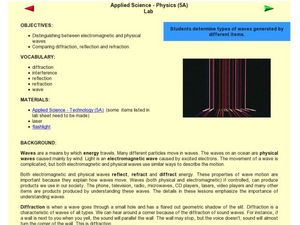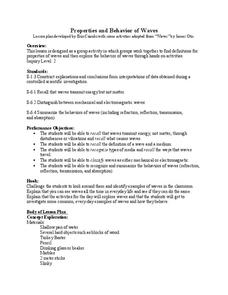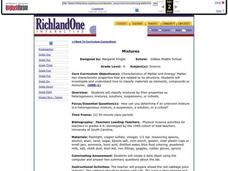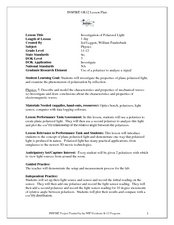Curated OER
Let's Do the Wave!
Young scholars distinguish waves from matter, differentiate between transverse and longitudinal waves, use sine curves as representations of transverse waves, label characteristic properties of waves, diagram transverse waves having...
Curated OER
Electromagnetic and Physical Waves
Students compare and contrast electromagnetic and physical waves. In this wave lesson plan, students discover that all waves reflect, refract, and diffract energy. Students work in small groups to experiment with waves and evaluate the...
Alabama Learning Exchange
Mirror, Mirror on the Wall: Reflections of Light
Why can we see our reflection in a window but not a brick wall? Young physicists learn the Law of Reflection and various light properties that help them answer this and other questions about reflection. Use the PowerPoint to introduce...
Curated OER
Waves
Students identify the different parts of a wave. In this physics lesson, students explain how animals communicate using sound waves. They discuss the effect of Navy's sonar on dolphins and whales.
Curated OER
What Are The Properties of Sea Water?
Ninth graders conduct research on the subject of sea water. They use a variety of resources to obtain information. There are helpful resource links listed in the activity. In conjunction with the research students make inquiry of the...
Curated OER
Properties and Behavior of Waves
High schoolers explore the different properties of waves. In this physics lesson, students differentiate mechanical and electromagnetic waves. They explore each lab station and write their observation about the wave behavior they see.
Curated OER
Earthquakes and Seismic Waves
Learners explore earthquakes and seismic waves. They investigate how energy is released in the subsurface to create seismic waves. Students explore the inner workings of a seismograph and how they are used to determine the location of an...
Curated OER
Stressed Out!
Have your class engage in lessons on earthquakes. Learners explore the science behind earthquakes using interactive websites and video clips. Then, they review the layers and parts of the Earth before delving into the causes of...
Curated OER
Wavelengths of Light
Explore physical science by participating in a visual spectrum experiments. Budding scientists identify the colors in the color spectrum and view the colors in class by utilizing cellophane, flash lights, and other arts and crafts...
Curated OER
Tsunami
Students explore tsunami through various hands-on activities. In this earth science lesson, students explain how they are formed. They create tsunami and earthquake models in the lab to observe how they are generated.
Curated OER
Earthquakes and Seismic Waves
Students investigate the Richter scale and seismology in a teacher-led lab in which they are introduced to the concept of seismic waves and epicenter location. They further investigate the inner workings of a seismograph and practice...
Curated OER
My World is Upside Down
Students observe a demonstration on light. They construct a pinhole viewer, and explore and discuss the concept that light travels in a straight line.
Curated OER
Which Wrap Is Wrapped Right?
Students investigate the integrity and strength of different types of food wraps. They test the wraps and create a graphic organizer for the data. Once it is organized then a lab report can be written. The lesson contains background...
Curated OER
Introduction to Gases
Students are introduced to gases. In this science lesson plan, students demonstrate that gases are a state of matter, generate a number of gases, discover some properties of gases, compare some of the properties of different gases, and...
National Nanotechnology Infrastructure Network
Powers of Ten with the Blue Morpho Butterfly
Explore the powers of ten while examining a Blue Morpho butterfly wing. Learners discover there is a lot more than meets the eye when one looks close enough.
Curated OER
Investigation of Hooke's Law Lab
Students determine the spring constant by conducting an investigation. In this physics lesson, students collect data and create a graph of force vs. displacement. They compare the results of two different methods to find spring constant.
Curated OER
Magnetic Discovery Bottle
Students examine how to conduct simple investigations and use simple equipment to gather data. In this magnet lesson plan students decide what types of objects are attracted to magnets.
Curated OER
What Shape Is It?
Pupils predict the shape of an unknown object by bouncing a ball on it. In this physics lesson plan, students relate this activity to how dolphins use echo-location to navigate. They analyze their lab result and discuss findings.
Curated OER
Mixtures
Sixth graders experiment with mixtures. In this chemistry instructional activity, 6th graders determine which mixtures are considered heterogeneous, a suspension, a solution or a colloid. Students create a data sheet of what they discover.
Curated OER
Investigation of Polarized Light
Students investigate how polorizers filter light. In this physics instructional activity, students record their data and plot their results using a computer logging software. They discuss practical applications of polarization.
Curated OER
Grating Spectrometer
Students calculate the Balmer series. In this physics lesson, students observe hydrogen lamp spectra using spectrometers. They calculate wavelength and compare them with their theoretical calculations.




















